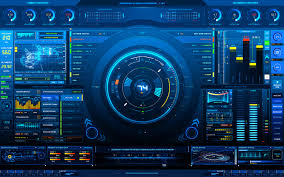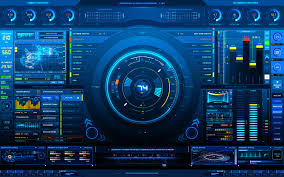
As the electronics holding automotive cockpits all together have become a rat's nest of components made by different parts makers, they become crammed with ever more digital features such as navigation and entertainment systems.
And as the industry accelerates toward a so-called virtual cockpit - an all-digital dashboard that will help usher in the era of self-driving cars, Visteon Corp is among a slew of suppliers aiming to make dashboard innards simpler, cheaper and lighter.
Estimated by research firm IHS Market to nearly double to $62 billion by 2022, a piece of the $37-billion cockpit electronics market is at stake. In the next two years, up from 13 percent in 2015, the electronics could account for up to 20 percent of a car's value, according to estimates of accounting firm PwC.
Meanwhile, according to Mark Boyadjis, principal automotive analyst at IHS Markit, as automakers look to work with fewer companies capable of doing more, the number of suppliers for those components is likely to dwindle.
"The complexity of engineering ten different systems from ten different suppliers is no longer something an automaker wants to do," Boyadjis said.
Down from six to 10 today, for each model, manufacturers eventually will work with two to three cockpit suppliers, he estimates.
A computer module dubbed "SmartCore" is one of Visteon's solutions. Using the same tiny piece of silicon, a vehicle's instrument cluster, infotainment system and other features are all operated by this cockpit domain controller.
Two big contracts for undisclosed sums has bene landed by the Detroit-based company so far this year. An agreement with Dongfeng Motor Corp - China's second-largest automaker, is one - announced in April. Another one is Mercedes-Benz. According to Visteon, planning to use the system in 2018 is another unnamed European automaker.
Having shed its remaining automotive climate and interiors businesses in 2016, Visteon is going all in on cockpit electronics. And the bet has been rewarding so far. Helped by growth in China, in the first quarter, the company secured $1.5 billion in new business. Over the past year, there has been a rise of 50 per cent in Visteon's stock price.
Since Visteon was spun off from Ford Motor Co a decade ago, it's a major turnaround for the company. Before emerging a year later, Visteon filed for bankruptcy protection in 2009.
"You have to be changing and adapting fast. If not, you're not going to keep up in this market," said Tim Yerdon, Visteon's head of global marketing. "It's about reinventing yourself to stay ahead."
Fighting for real estate in the digital cockpit, Visteon's makeover hints at the coming battle between suppliers. And as companies look to boost their offerings to automakers, the trend is already triggering acquisitions.
Also developing a domain controller, in 2014, Johnson Controls' electronics business was bought by Visteon. $8-billion purchase of infotainment company Harman was completed by Samsung in March. In a deal that could make Faurecia the biggest shareholder by 2019, a 20 percent stake in Paris-based infotainment firm Parrot Automotive SAS was purchased last year by France's Faurecia, a top seating and interiors supplier.
In consolidating functions within the dashboard, German automakers are taking the lead, analysts say. A virtual cockpit that combined its instrument cluster and infotainment system was started by Audi.
Five years ago, the dashboard was "a plastic molded cockpit that we stuffed electronics into," said Yerdon, Visteon's marketing chief. "Now it's more about an electronic architecture that's experience-driven, and we mold plastic around it."
(Source:www.reuters.com)
And as the industry accelerates toward a so-called virtual cockpit - an all-digital dashboard that will help usher in the era of self-driving cars, Visteon Corp is among a slew of suppliers aiming to make dashboard innards simpler, cheaper and lighter.
Estimated by research firm IHS Market to nearly double to $62 billion by 2022, a piece of the $37-billion cockpit electronics market is at stake. In the next two years, up from 13 percent in 2015, the electronics could account for up to 20 percent of a car's value, according to estimates of accounting firm PwC.
Meanwhile, according to Mark Boyadjis, principal automotive analyst at IHS Markit, as automakers look to work with fewer companies capable of doing more, the number of suppliers for those components is likely to dwindle.
"The complexity of engineering ten different systems from ten different suppliers is no longer something an automaker wants to do," Boyadjis said.
Down from six to 10 today, for each model, manufacturers eventually will work with two to three cockpit suppliers, he estimates.
A computer module dubbed "SmartCore" is one of Visteon's solutions. Using the same tiny piece of silicon, a vehicle's instrument cluster, infotainment system and other features are all operated by this cockpit domain controller.
Two big contracts for undisclosed sums has bene landed by the Detroit-based company so far this year. An agreement with Dongfeng Motor Corp - China's second-largest automaker, is one - announced in April. Another one is Mercedes-Benz. According to Visteon, planning to use the system in 2018 is another unnamed European automaker.
Having shed its remaining automotive climate and interiors businesses in 2016, Visteon is going all in on cockpit electronics. And the bet has been rewarding so far. Helped by growth in China, in the first quarter, the company secured $1.5 billion in new business. Over the past year, there has been a rise of 50 per cent in Visteon's stock price.
Since Visteon was spun off from Ford Motor Co a decade ago, it's a major turnaround for the company. Before emerging a year later, Visteon filed for bankruptcy protection in 2009.
"You have to be changing and adapting fast. If not, you're not going to keep up in this market," said Tim Yerdon, Visteon's head of global marketing. "It's about reinventing yourself to stay ahead."
Fighting for real estate in the digital cockpit, Visteon's makeover hints at the coming battle between suppliers. And as companies look to boost their offerings to automakers, the trend is already triggering acquisitions.
Also developing a domain controller, in 2014, Johnson Controls' electronics business was bought by Visteon. $8-billion purchase of infotainment company Harman was completed by Samsung in March. In a deal that could make Faurecia the biggest shareholder by 2019, a 20 percent stake in Paris-based infotainment firm Parrot Automotive SAS was purchased last year by France's Faurecia, a top seating and interiors supplier.
In consolidating functions within the dashboard, German automakers are taking the lead, analysts say. A virtual cockpit that combined its instrument cluster and infotainment system was started by Audi.
Five years ago, the dashboard was "a plastic molded cockpit that we stuffed electronics into," said Yerdon, Visteon's marketing chief. "Now it's more about an electronic architecture that's experience-driven, and we mold plastic around it."
(Source:www.reuters.com)














